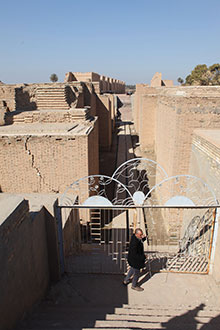
Earlier this month I was honored to serve as international faculty for a two-day seminar in Najaf, Iraq, sponsored by AOSpine Middle East. This was my third visit to Iraq for an AOSpine course, but my first time in Najaf. Although these teaching trips bear some resemblance to the work I do each year in Tanzania, the circumstances are very different. This trip especially exposed me to a great deal of Middle East history, and to the effects of international conflict on the ability to serve local patients.
In this year’s course, 100 Iraqi spine surgeons assembled to learn advanced spine surgical techniques and procedures. Unlike Tanzania, where our goal is to train local providers in the basics of neurotrauma care, in Iraq we are teaching well-read, well-educated spine specialists — neurosurgeons as well as orthopedic surgeons — who work every day without the resources or facilities to perform to their capacity. They have the skills, as well as a hunger for advanced learning, but they have no access to infrastructure in this embattled country.
The course was held in a hotel very near the Imam Ali Mosque in Najaf, which is a Shiite holy city about 100 miles south of Baghdad and just 50 miles from the ancient city of Babylon. I was fortunate to have an extra day in Najaf after the conference, and even more fortunate to be invited to visit Babylon as the guest of a local politician who lent me his security detail and a four-wheel drive vehicle with a driver to take out this remarkable site.
Leveled and rebuilt multiple times during its thousands of years of history, the city — located between the Tigris and Euphrates Rivers in the very cradle of civilization — was once a major city in Mesopotamia, and home to the legendary Hanging Gardens of Babylon. The site has alternately been restored, ruined, and restored again, as weather, wars, and looters took their toll. Remarkably, I was the only person visiting the site that day, so I was able to walk around on my own to absorb it all.
The current structures at Babylon were erected during the rule of Saddam Hussein, who had much of the existing structures razed rather than restored. He also built himself a huge palace overlooking the ancient site. That palace has since been completely looted, and the inexpert reconstruction is crumbling. It is absolutely heartbreaking to think of the archeological treasures that have been destroyed there, both intentionally and thoughtlessly — one of the most important sites in the history of civilization, destroyed by incivility.
I left the site thinking about how my international travels have enriched me personally; I hope the courses I’ve helped teach in Europe, Africa, and the Middle East have added to the skills of neurosurgeons and have helped save lives on those continents. The international exchange of fellows is especially important to keep sharpening skills around the world, improving patient care and leading to better outcomes everywhere. Many of the surgeons I met in Iraq on this trip are extremely concerned about the current uncertainty in international travel, and some I spoke to have postponed or cancelled plans to come to the United States for study. I can only hope that the global flow of information and talent can safely resume soon.